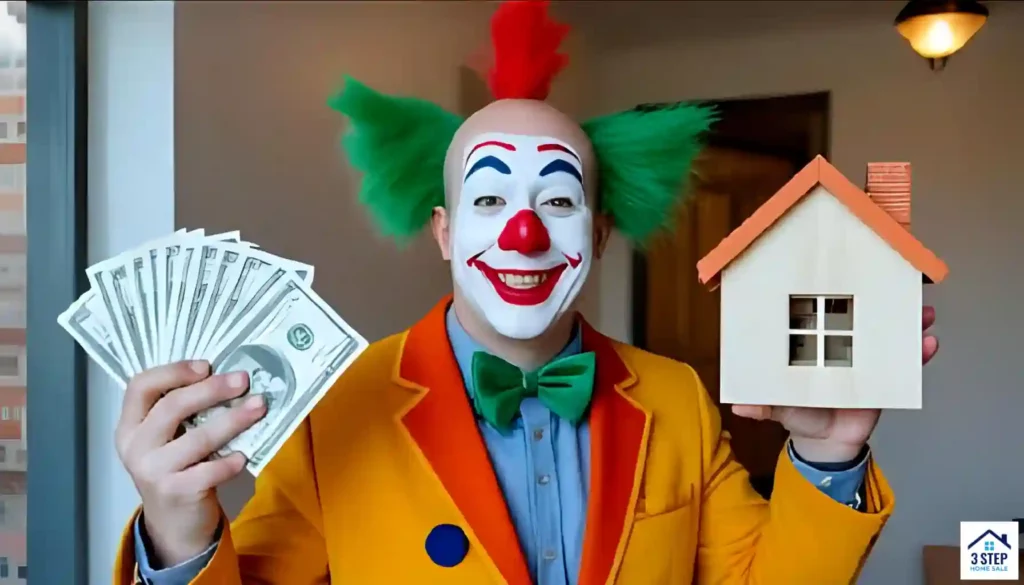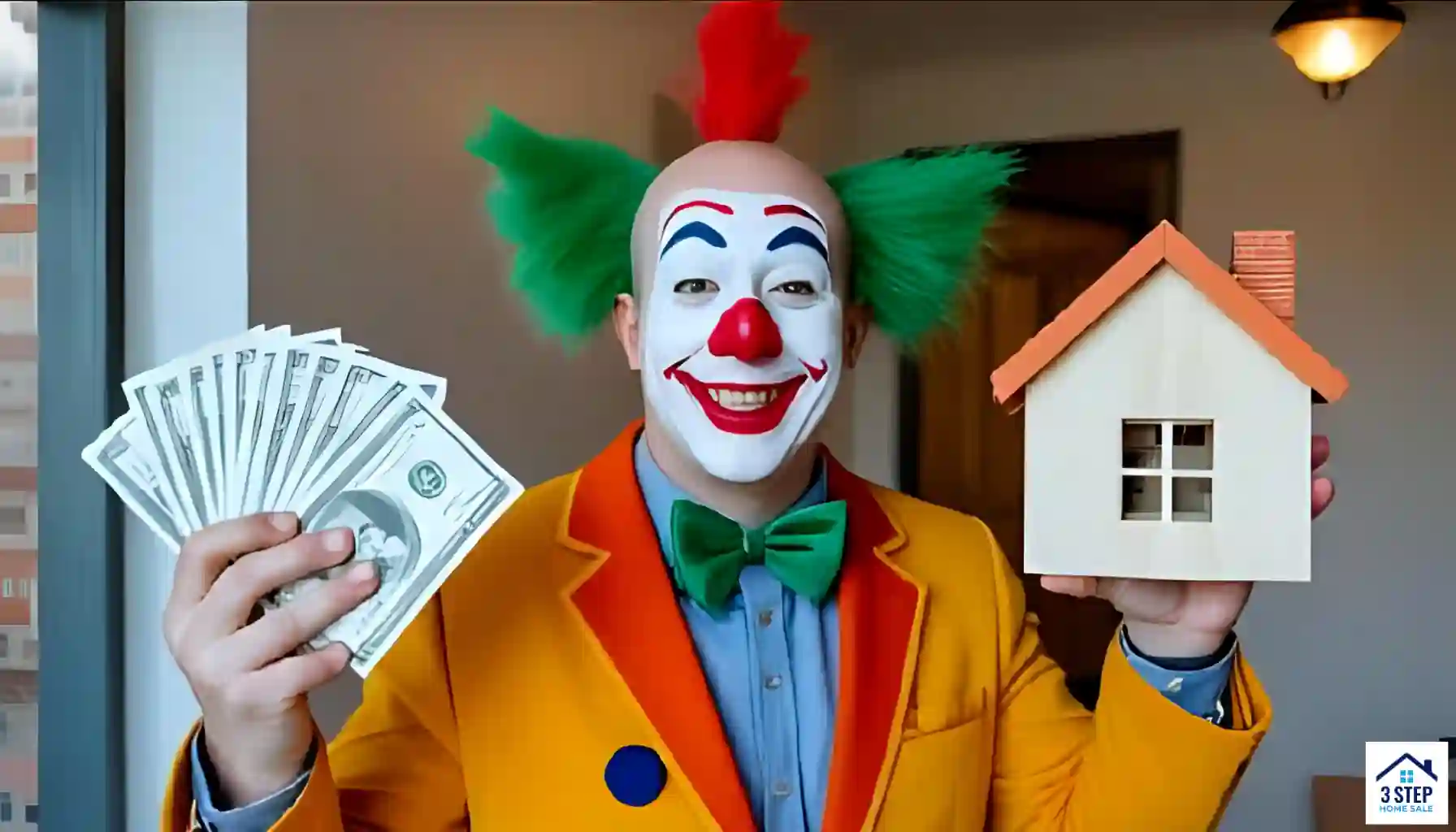
Why Are So Many Cash Offers on Houses Fake?
Most “cash offers” on houses are fake because the people making them don’t really have the money to buy your home. They’re usually middlemen called wholesalers who pretend to be real buyers but are only trying to lock your house under contract so they can sell that deal to someone else for a profit. That’s why so many sellers get stuck waiting, dealing with delays, or watching the buyer suddenly back out at the last minute.
At 3 Step Home Sale, we don’t play those games. We use our own money to buy your house directly, no middlemen, no waiting, and no fake promises. When we make a cash offer, it’s real, and we close when you’re ready. It’s that simple.
Let’s uncover more truth about why sellers are getting burned, what “fake offers” really look like, how to protect yourself before signing the dotted line, and safely sell your house.
Get An Offer Today & Pick Your Close Date
Fill Out the Form and Our Team Will Call With Your Offer
The Fake Promise of High Offers
One of the biggest tricks shady buyers use is dangling an inflated price. They know sellers get excited when they hear a number above market value, so they make a flashy offer to get you locked in.
But here’s the catch:
- They don’t plan to actually pay that amount.
- Their goal is to tie up your property, shop it around to other investors, and if they can’t flip it, they walk away.
Meanwhile, you’ve wasted valuable time. You’ve turned down legitimate buyers because you were blinded by a big fake number. The high-ball offer is nothing more than bait, and thousands of homeowners fall for it every year.
The Delayed Closing Game
“Don’t worry, we’ll close quickly.” That’s the line. But instead of days, the closing timeline gets dragged out for weeks or months. Here’s why:
- Some buyers don’t actually have cash, they’re scrambling to find funding.
- Others are trying to reassign the deal behind the scenes.
- Many simply hope you’ll get so frustrated that you’ll accept a lower price later.
Every week that passes means stress, uncertainty, and possibly missed opportunities. Sellers who thought they had a done deal often end up back at square one, but with less time and more pressure.
Low Deposits = Zero Commitment
A real buyer will put down real money. But most “cash buyers” don’t. They’ll write a contract with a tiny deposit, sometimes as low as $10 or $100. That means they have no skin in the game. They can walk away at any time without losing anything. You, on the other hand, are the one carrying all the risk. If someone isn’t willing to put down a serious deposit, that’s your first red flag. Truth is, you can sell your house without delays for cash.
Fill Out the Form and Our Team Will Call With Your Offer
The Worst-Case Scenario: Memo on Title
If the high-ball offers and low deposits weren’t bad enough, there’s something far worse: the memorandum of title. This is when a buyer records a document against your property, claiming they have the right to purchase it. Even if they don’t intend to close, that memo makes it nearly impossible for you to sell to someone else.
IT’S A TRAP. You’re locked in a deal with someone who might never pay you. In the meantime, your life is on hold. This is the dirty trick that leaves many sellers feeling completely powerless.
Why Sellers Keep Getting Burned?
You might wonder: “How do buyers get away with this?” The answer is simple: there’s very little regulation in the space. Anyone can call themselves a “cash buyer.” There’s no licensing, no oversight, and very little accountability.
That’s why 90% of cash offers never make it to the finish line. The numbers don’t lie. That means if you’re talking to 10 buyers, only one is likely to follow through. The other nine will either back out, renegotiate, or tie up your property with no intention of closing. It’s a gamble most homeowners can’t afford to take.
How Sellers Can Protect Themselves From Fake Buyers?
Sellers can protect themselves from fake cash buyers by confirming proof of funds, requesting a deposit, and researching the buyer’s credibility. While most cash buyers don’t follow through, summarized below are steps you can do:
- Ask for Proof of Funds – A real buyer won’t hesitate to show recent bank statements or a letter from their financial institution. If they dodge this, it’s a red flag.
- Require a Real Deposit – Serious buyers put money on the line. A deposit of at least 1–2% of the purchase price, held in escrow, shows true commitment.
- Set Clear Deadlines – Don’t agree to open-ended extensions. Insist on written timelines for inspections and closing. Genuine buyers respect your schedule.
- Research the Buyer – Look up their company online, check reviews, and verify with the Better Business Bureau. Longevity and positive feedback matter.
- Watch for Red Flags – Overly high offers, vague answers, or resistance to providing documents are classic signs you’re dealing with a pretender.
By following these steps, you’ll quickly separate the real buyers from the 90% who waste sellers’ time.
The Safer Alternative!
Not all cash buyers are created equal. While many lure homeowners with fake promises, high numbers they never intend to pay, and contracts designed to trap you, only a small handful of reputable companies actually deliver, closing quickly, fairly, and without the games.
That’s where 3 Step Home Sale stands apart. We’ve built our reputation on being the opposite of the 90% who waste your time. We don’t throw out flashy numbers just to lock up your property. We don’t drag out closings or leave you hanging. Instead, we do exactly what we say: make an honest, transparent cash offer and follow through.
Because when you’re selling your home in Virginia and Maryland, you deserve certainty, not stress. You deserve a buyer who shows up, funds the deal, and closes when promised. You’ll never have to wonder if your buyer is going to vanish. You’ll know you’ve partnered with a team that values your time, respects your situation, and has the resources to get it done.
Frequently Asked Questions
How can I tell if a cash offer on my house is real or fake?
A real cash offer comes from a verified buyer who provides proof of funds and a clear purchase agreement without hidden contingencies. Fake cash buyers often avoid showing documentation, pressure you to sign quickly, or back out right before closing. Always request written proof of funds from a legitimate financial institution and verify the buyer’s identity before proceeding.
Why are so many cash home buyers fake or unreliable?
Many so-called “cash buyers” are actually wholesalers who don’t have their own money, they make offers, then try to sell your contract to someone else. When they fail to find a real investor, the deal collapses, leaving sellers stuck and stressed. Genuine cash buyers purchase properties directly with their own funds and can close within days, not weeks.
What are the red flags that a cash offer isn’t legitimate?
Common red flags include buyers who refuse to show proof of funds, change the contract terms last minute, or use vague, one-page agreements. Watch out for anyone demanding access to your property before signing or pushing unrealistic timelines. Legitimate cash buyers communicate clearly, use standard real estate contracts, and never ask for upfront payments.
How can I protect myself from fake cash buyers when selling my house fast?
Always verify the buyer’s credentials, ask for proof of funds, and work with a reputable local home-buying company or licensed title company. Avoid signing any agreement you don’t fully understand, and never hand over keys or personal information until closing. Doing simple due diligence helps you sell safely, avoid scams, and secure a guaranteed cash sale.
Still Have Questions? Visit our FAQ page.
Sell Your House As-Is In:
Fairfax | Vienna | Falls Church | Upper Marlboro | Severna Park | Bowie


